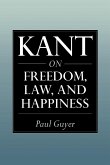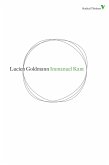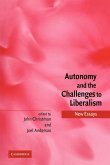- Broschiertes Buch
- Merkliste
- Auf die Merkliste
- Bewerten Bewerten
- Teilen
- Produkt teilen
- Produkterinnerung
- Produkterinnerung
InRescuing Autonomy from Kant, James Furner argues that Marxism's relation to Kant's ethics is not one of irrelevance, complementarity or incompatibility, but critique. Although Kant's formulas of the categorical imperative presuppose a belief in God that Kant cannot motivate, the value of autonomy can instead be grounded by appeal to an antinomy in capitalism's basic structure, and this commits us to socialism.
Andere Kunden interessierten sich auch für
![Structures of Language Structures of Language]() Joan CasserStructures of Language35,99 €
Joan CasserStructures of Language35,99 €![Karel Kosík and the Dialectics of the Concrete Karel Kosík and the Dialectics of the Concrete]() Karel Kosík and the Dialectics of the Concrete35,99 €
Karel Kosík and the Dialectics of the Concrete35,99 €![Late Kant Late Kant]() Peter FenvesLate Kant71,99 €
Peter FenvesLate Kant71,99 €![Kant on Freedom, Law, and Happiness Kant on Freedom, Law, and Happiness]() Paul GuyerKant on Freedom, Law, and Happiness45,99 €
Paul GuyerKant on Freedom, Law, and Happiness45,99 €![Immanuel Kant Immanuel Kant]() Lucien GoldmannImmanuel Kant27,99 €
Lucien GoldmannImmanuel Kant27,99 €![Autonomy and the Challenges to Liberalism Autonomy and the Challenges to Liberalism]() Autonomy and the Challenges to Liberalism73,99 €
Autonomy and the Challenges to Liberalism73,99 €![Kant Dictionary Kant Dictionary]() Morris StockhammerKant Dictionary18,99 €
Morris StockhammerKant Dictionary18,99 €-
-
-
InRescuing Autonomy from Kant, James Furner argues that Marxism's relation to Kant's ethics is not one of irrelevance, complementarity or incompatibility, but critique. Although Kant's formulas of the categorical imperative presuppose a belief in God that Kant cannot motivate, the value of autonomy can instead be grounded by appeal to an antinomy in capitalism's basic structure, and this commits us to socialism.
Hinweis: Dieser Artikel kann nur an eine deutsche Lieferadresse ausgeliefert werden.
Hinweis: Dieser Artikel kann nur an eine deutsche Lieferadresse ausgeliefert werden.
Produktdetails
- Produktdetails
- Verlag: Haymarket Books
- Seitenzahl: 351
- Erscheinungstermin: 23. Januar 2024
- Englisch
- Abmessung: 152mm x 230mm x 20mm
- Gewicht: 522g
- ISBN-13: 9798888900031
- Artikelnr.: 67411621
- Herstellerkennzeichnung
- Libri GmbH
- Europaallee 1
- 36244 Bad Hersfeld
- gpsr@libri.de
- Verlag: Haymarket Books
- Seitenzahl: 351
- Erscheinungstermin: 23. Januar 2024
- Englisch
- Abmessung: 152mm x 230mm x 20mm
- Gewicht: 522g
- ISBN-13: 9798888900031
- Artikelnr.: 67411621
- Herstellerkennzeichnung
- Libri GmbH
- Europaallee 1
- 36244 Bad Hersfeld
- gpsr@libri.de
James Furner is the author ofMarx on Capitalism: the Interaction-Recognition-Antinomy Thesis.
Part I Three Views of Marxism’s Relation to Kant’s Ethics
Introduction to Part I
1 Against the Irrelevance View
1 The Instrumental Reasons Argument
2 The False Claims Argument
3 The Ideology Argument
4 The Class Interests Argument
5 Summary
2 Against the Complementarity View, Part 1: Socialist Strategy
1 The Complementarity View: Stammler, Staudinger, Vorländer
2 An Objection to the Complementarity View
3 The Deficient Self-Understanding Claim: A Critique
3 Against the Complementarity View, Part 2: Can Kant’s Formula of the End
in Itself Condemn Capitalism?
1 FEI-Based Arguments against Capitalism
2 Kant’s Never Merely as a Means Principle
3 Applying FEI: Some General Considerations
4 Applying FEI beyond Kant
5 Evaluation of the Arguments
6 FEI and General Injustice
7 Conclusion
4 Against the Incompatibility View
1 Two Components of Human Freedom
2 Marx on Human Freedom
3 The True Realm of Freedom and the Realm of Necessity
4 The Link to Autonomy
5 Marx on the Autonomy of a Human Community
6 Marx’s Commitment to a Critique of Kant’s Ethics
7 Summary
Part II A Critique of Kant’s Ethics
Introduction to Part II
5 Kant’s Contradiction in Conception Test
1 The Basic Features of the Causal-Teleological Version of LCI
2 Further Features of a Causal-Teleological Version of LCI
3 The Suicide Maxim
4 The False Promising Maxim
5 Summary
6 Kant’s Contradiction in the Will Test
1 Assessment Criteria
2 Assessing the Existing Interpretations
3 The Extravagant Imperfect Nature Interpretation
4 Formulating the Groundwork’s Two Maxims
5 The Maxim of Neglecting Natural Gifts
6 The Maxim of Refusing to Help
7 Summary
7 The Principle of Suitability Interpretation of Kant’s Formula of the Law
of Nature
1 The Contradiction in Conception Test
2 The Contradiction in the Will Test
8 Kant’s Argument for the Formula of the End in Itself
1 The Structure of Kant’s Argument for FEI
2 Steps 1–3
3 Step 4: the Logical Pluralism Version of Kant’s Regressive Argument
4 Advantages of the Logical Pluralism Version of Kant’s Regressive
Argument
5 Humanity, Personality and a Belief in the Existence of God
9 Kant’s Arguments for a Belief in the Existence of God
1 Kant’s Concept of the Highest Good
2 The Argument from the Highest Good
3 Wood’s Version of the Argument from the Highest Good
4 The Objection from Moral Happiness
5 The Physicoteleological Argument
6 Conclusion
Part III Founding a Post-Kantian Ethics
Introduction to Part III
10 A Marxist Argument for Autonomy
1 Relativising Practical Reason
2 An Argumentative Strategy
3 The Need for a Duty to the Whole
4 The General Features of a Foundational Argument
5 A Lesson from Mill’s ‘Proof’
6 The Distinctive Features of a Marxist Foundational Argument
7 A Simple Account of Capitalism’s Basic Structure
8 Explaining the Premises
9 The Rights-Antinomy
10 Resolving the Rights-Antinomy
11 The System Universalisability Principle of Justice
12 The Autonomy of a Human Community
13 Summary
14 The Justification of Socialist Strategy
15 Conclusion
Bibliography
Index
Introduction to Part I
1 Against the Irrelevance View
1 The Instrumental Reasons Argument
2 The False Claims Argument
3 The Ideology Argument
4 The Class Interests Argument
5 Summary
2 Against the Complementarity View, Part 1: Socialist Strategy
1 The Complementarity View: Stammler, Staudinger, Vorländer
2 An Objection to the Complementarity View
3 The Deficient Self-Understanding Claim: A Critique
3 Against the Complementarity View, Part 2: Can Kant’s Formula of the End
in Itself Condemn Capitalism?
1 FEI-Based Arguments against Capitalism
2 Kant’s Never Merely as a Means Principle
3 Applying FEI: Some General Considerations
4 Applying FEI beyond Kant
5 Evaluation of the Arguments
6 FEI and General Injustice
7 Conclusion
4 Against the Incompatibility View
1 Two Components of Human Freedom
2 Marx on Human Freedom
3 The True Realm of Freedom and the Realm of Necessity
4 The Link to Autonomy
5 Marx on the Autonomy of a Human Community
6 Marx’s Commitment to a Critique of Kant’s Ethics
7 Summary
Part II A Critique of Kant’s Ethics
Introduction to Part II
5 Kant’s Contradiction in Conception Test
1 The Basic Features of the Causal-Teleological Version of LCI
2 Further Features of a Causal-Teleological Version of LCI
3 The Suicide Maxim
4 The False Promising Maxim
5 Summary
6 Kant’s Contradiction in the Will Test
1 Assessment Criteria
2 Assessing the Existing Interpretations
3 The Extravagant Imperfect Nature Interpretation
4 Formulating the Groundwork’s Two Maxims
5 The Maxim of Neglecting Natural Gifts
6 The Maxim of Refusing to Help
7 Summary
7 The Principle of Suitability Interpretation of Kant’s Formula of the Law
of Nature
1 The Contradiction in Conception Test
2 The Contradiction in the Will Test
8 Kant’s Argument for the Formula of the End in Itself
1 The Structure of Kant’s Argument for FEI
2 Steps 1–3
3 Step 4: the Logical Pluralism Version of Kant’s Regressive Argument
4 Advantages of the Logical Pluralism Version of Kant’s Regressive
Argument
5 Humanity, Personality and a Belief in the Existence of God
9 Kant’s Arguments for a Belief in the Existence of God
1 Kant’s Concept of the Highest Good
2 The Argument from the Highest Good
3 Wood’s Version of the Argument from the Highest Good
4 The Objection from Moral Happiness
5 The Physicoteleological Argument
6 Conclusion
Part III Founding a Post-Kantian Ethics
Introduction to Part III
10 A Marxist Argument for Autonomy
1 Relativising Practical Reason
2 An Argumentative Strategy
3 The Need for a Duty to the Whole
4 The General Features of a Foundational Argument
5 A Lesson from Mill’s ‘Proof’
6 The Distinctive Features of a Marxist Foundational Argument
7 A Simple Account of Capitalism’s Basic Structure
8 Explaining the Premises
9 The Rights-Antinomy
10 Resolving the Rights-Antinomy
11 The System Universalisability Principle of Justice
12 The Autonomy of a Human Community
13 Summary
14 The Justification of Socialist Strategy
15 Conclusion
Bibliography
Index
Part I Three Views of Marxism’s Relation to Kant’s Ethics
Introduction to Part I
1 Against the Irrelevance View
1 The Instrumental Reasons Argument
2 The False Claims Argument
3 The Ideology Argument
4 The Class Interests Argument
5 Summary
2 Against the Complementarity View, Part 1: Socialist Strategy
1 The Complementarity View: Stammler, Staudinger, Vorländer
2 An Objection to the Complementarity View
3 The Deficient Self-Understanding Claim: A Critique
3 Against the Complementarity View, Part 2: Can Kant’s Formula of the End
in Itself Condemn Capitalism?
1 FEI-Based Arguments against Capitalism
2 Kant’s Never Merely as a Means Principle
3 Applying FEI: Some General Considerations
4 Applying FEI beyond Kant
5 Evaluation of the Arguments
6 FEI and General Injustice
7 Conclusion
4 Against the Incompatibility View
1 Two Components of Human Freedom
2 Marx on Human Freedom
3 The True Realm of Freedom and the Realm of Necessity
4 The Link to Autonomy
5 Marx on the Autonomy of a Human Community
6 Marx’s Commitment to a Critique of Kant’s Ethics
7 Summary
Part II A Critique of Kant’s Ethics
Introduction to Part II
5 Kant’s Contradiction in Conception Test
1 The Basic Features of the Causal-Teleological Version of LCI
2 Further Features of a Causal-Teleological Version of LCI
3 The Suicide Maxim
4 The False Promising Maxim
5 Summary
6 Kant’s Contradiction in the Will Test
1 Assessment Criteria
2 Assessing the Existing Interpretations
3 The Extravagant Imperfect Nature Interpretation
4 Formulating the Groundwork’s Two Maxims
5 The Maxim of Neglecting Natural Gifts
6 The Maxim of Refusing to Help
7 Summary
7 The Principle of Suitability Interpretation of Kant’s Formula of the Law
of Nature
1 The Contradiction in Conception Test
2 The Contradiction in the Will Test
8 Kant’s Argument for the Formula of the End in Itself
1 The Structure of Kant’s Argument for FEI
2 Steps 1–3
3 Step 4: the Logical Pluralism Version of Kant’s Regressive Argument
4 Advantages of the Logical Pluralism Version of Kant’s Regressive
Argument
5 Humanity, Personality and a Belief in the Existence of God
9 Kant’s Arguments for a Belief in the Existence of God
1 Kant’s Concept of the Highest Good
2 The Argument from the Highest Good
3 Wood’s Version of the Argument from the Highest Good
4 The Objection from Moral Happiness
5 The Physicoteleological Argument
6 Conclusion
Part III Founding a Post-Kantian Ethics
Introduction to Part III
10 A Marxist Argument for Autonomy
1 Relativising Practical Reason
2 An Argumentative Strategy
3 The Need for a Duty to the Whole
4 The General Features of a Foundational Argument
5 A Lesson from Mill’s ‘Proof’
6 The Distinctive Features of a Marxist Foundational Argument
7 A Simple Account of Capitalism’s Basic Structure
8 Explaining the Premises
9 The Rights-Antinomy
10 Resolving the Rights-Antinomy
11 The System Universalisability Principle of Justice
12 The Autonomy of a Human Community
13 Summary
14 The Justification of Socialist Strategy
15 Conclusion
Bibliography
Index
Introduction to Part I
1 Against the Irrelevance View
1 The Instrumental Reasons Argument
2 The False Claims Argument
3 The Ideology Argument
4 The Class Interests Argument
5 Summary
2 Against the Complementarity View, Part 1: Socialist Strategy
1 The Complementarity View: Stammler, Staudinger, Vorländer
2 An Objection to the Complementarity View
3 The Deficient Self-Understanding Claim: A Critique
3 Against the Complementarity View, Part 2: Can Kant’s Formula of the End
in Itself Condemn Capitalism?
1 FEI-Based Arguments against Capitalism
2 Kant’s Never Merely as a Means Principle
3 Applying FEI: Some General Considerations
4 Applying FEI beyond Kant
5 Evaluation of the Arguments
6 FEI and General Injustice
7 Conclusion
4 Against the Incompatibility View
1 Two Components of Human Freedom
2 Marx on Human Freedom
3 The True Realm of Freedom and the Realm of Necessity
4 The Link to Autonomy
5 Marx on the Autonomy of a Human Community
6 Marx’s Commitment to a Critique of Kant’s Ethics
7 Summary
Part II A Critique of Kant’s Ethics
Introduction to Part II
5 Kant’s Contradiction in Conception Test
1 The Basic Features of the Causal-Teleological Version of LCI
2 Further Features of a Causal-Teleological Version of LCI
3 The Suicide Maxim
4 The False Promising Maxim
5 Summary
6 Kant’s Contradiction in the Will Test
1 Assessment Criteria
2 Assessing the Existing Interpretations
3 The Extravagant Imperfect Nature Interpretation
4 Formulating the Groundwork’s Two Maxims
5 The Maxim of Neglecting Natural Gifts
6 The Maxim of Refusing to Help
7 Summary
7 The Principle of Suitability Interpretation of Kant’s Formula of the Law
of Nature
1 The Contradiction in Conception Test
2 The Contradiction in the Will Test
8 Kant’s Argument for the Formula of the End in Itself
1 The Structure of Kant’s Argument for FEI
2 Steps 1–3
3 Step 4: the Logical Pluralism Version of Kant’s Regressive Argument
4 Advantages of the Logical Pluralism Version of Kant’s Regressive
Argument
5 Humanity, Personality and a Belief in the Existence of God
9 Kant’s Arguments for a Belief in the Existence of God
1 Kant’s Concept of the Highest Good
2 The Argument from the Highest Good
3 Wood’s Version of the Argument from the Highest Good
4 The Objection from Moral Happiness
5 The Physicoteleological Argument
6 Conclusion
Part III Founding a Post-Kantian Ethics
Introduction to Part III
10 A Marxist Argument for Autonomy
1 Relativising Practical Reason
2 An Argumentative Strategy
3 The Need for a Duty to the Whole
4 The General Features of a Foundational Argument
5 A Lesson from Mill’s ‘Proof’
6 The Distinctive Features of a Marxist Foundational Argument
7 A Simple Account of Capitalism’s Basic Structure
8 Explaining the Premises
9 The Rights-Antinomy
10 Resolving the Rights-Antinomy
11 The System Universalisability Principle of Justice
12 The Autonomy of a Human Community
13 Summary
14 The Justification of Socialist Strategy
15 Conclusion
Bibliography
Index








